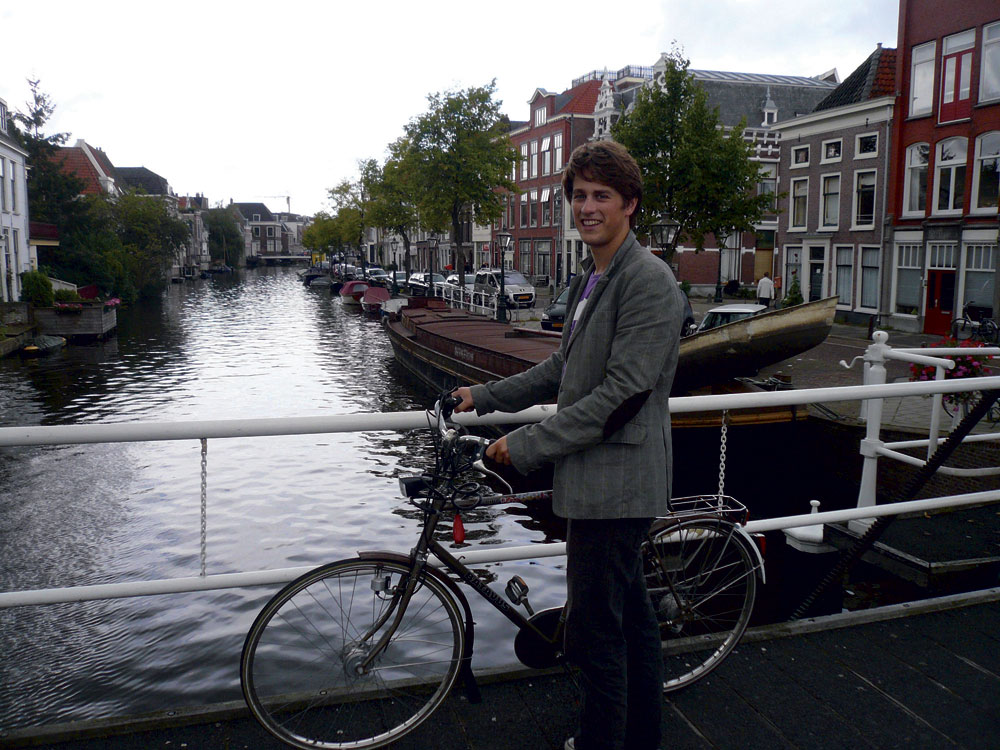Name: Samuel Wicki (MSc Industrial Ecology from Switzerland)
Brand: Batavus
Price: €50.0
0
Striking Feature: Brakes don’t work!
“I’m doing the MSc Industrial Ecology programme, which is a joint-programme between TU Delft and Leiden, so I am always bouncing back and forth and must have a good bike for transportation to and from the train stations and campuses.
I bought my first bike during introduction week at Leiden University. The municipality is always collecting bikes that are parked illegally, and the ones that are not claimed are resold to international students during orientation week. There were dozens of bikes to choose from. First I thought I should get a racing bike, but then I saw what the Dutch call an oma-fiets, and I thought, ‘Wow, this is so Dutch! I should really own a bike like this while I’m studying here.’ I took it for a test-ride and liked the feeling of sitting upright and thought that this would be a convenient bike for getting around town.
After a while I decided I wanted a slightly faster bike that was still good for running errands in town. So, I traded in the oma-fiets for the Batavus. It’s perfect for getting around quickly.
The bike has two problems. First, the brakes don’t work very well, so I’ve had to learn how to avoid cars and people very well without braking. Second, the lights don’t work. I didn’t think this was much of a problem until I got a €46.00 fine one night. Such a high fine! I tried to negotiate to pay only half, because the back light was working and only the front light was out, but they still charged me the full amount.
Biking is probably the best way to get around. It makes no noise, doesn’t pollute, and you get exercise at the same time. I like that I can give a friend a ride on the back. One great thing about living in Holland is that you can bike to the beach in under an hour. As I’m from Switzerland, it feels very exotic for me to be able to do this.”
“What is it you want?”, asks Medical Delta Café’s discussion leader, leaning towards Dr Frans Vos, of the Quantitative Imaging department (Applied Sciences), to see what’s written on his jacket sticker. Not ‘people’ or ‘collaboration’ is written there, but rather ‘money’. The audience laughs.
The questions debated last Tuesday during a meeting organised by Medical Delta, a joint venture involving the universities of Leiden, Rotterdam and Delft, was whether computer-aided diagnosis could improve future healthcare and how researchers and industry should work together to innovate.
Vos, who also works at Amsterdam’s Academic Medical Center (AMC), spoke of his efforts to improve virtual colonoscopy, a medical imaging technique that searches for intestinal polyps using 3D-imagery. His work is sponsored by Philips.
Vos said that 200,000 EU citizens died of colon cancer in 2002, yet many lives could be saved if people were periodically screened. “But”, he added, “forty percent of the people considered for screening refuse.”
Such assertiveness isn’t surprising, Vos states, because prior to undergoing optical colonoscopy (still the standard procedure) patients must first cleanse their bowels by drinking “five litres of a disgusting liquid”.
In future, virtual colonoscopy could spare patients this trouble. Currently, some radiologists search for polyps using images and algorithms as a second scanner, but they aren’t allowed to only use virtual colonoscopy, as the technique hasn’t yet fully matured.
The next speaker, Joost Peeters, a Philips Healthcare clinical software researcher, said technologies like computer-aided diagnosis will only develop if the Food & Drug Administration makes their regulatory rules for new medical technologies much clearer.
Finally, Ard den Heeten, an AMC radiologist and founder of a spin-off company specialising in screening technology, was clearly no fan of multinationals like Philips. “If you want innovate”, he said, “you must start your own spin-off company. Otherwise you’ll fall into the hands of big companies that suddenly start reorganising their R&D departments.”



Comments are closed.